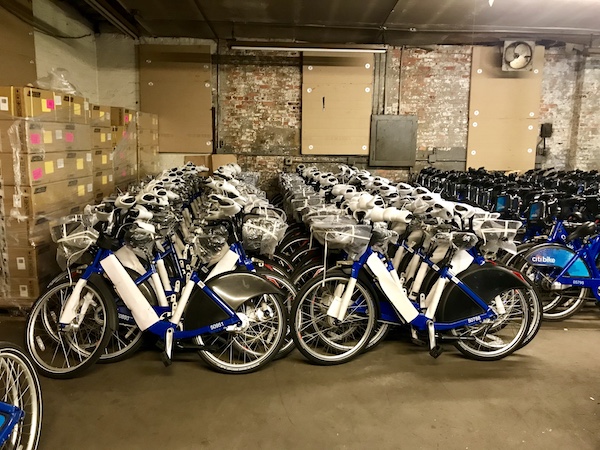Thousands of Citi Bikes are in the shop for repairs, but the company has some good news: 500 brand new cycles are rolling out this week.
It’s a small symbol of recovery for the bike share company, which came under fire last week after Streetsblog reviewed public data to reveal that Citi Bike was not keeping even 60 percent of its 12,000-bike fleet on the road — and hasn’t come close to its contract-mandated 97 percent levels in months.
But new bikes — part of an entirely new generation of Citi Bikes rather than merely restored or retrofitted ones — starting hitting the streets on Monday, with all 500 to be available by Wednesday, a spokeswoman said.
The new cohort will relieve some of the pressure on the company as it makes repairs to ailing handlebars on earlier generations of bikes. The company announced its repair effort hours after Streetsblog’s story last week. In a follow-up piece, Streetsblog revealed that the de Blasio administration is declining to punish Citi Bike for the fleet shortfall, opting not to dock the company $1.5 million in accumulated charges due to missing the target fleet service level every day in September. The number fluctuated in September, with up to 43 percent of the fleet offline towards the end of the month. There was never more than 72 percent of the fleet available at any time in September.
Citi Bike said the new bikes were "part of our ongoing efforts to increase the fleet size and improve bike availability.” The bikes have a better basket design released earlier this year and, the statement continued, “new handlebar design.”
The new bikes — and the crisis that continues — come as city officials ponder the next act in expanding what is acknowledged to be a nation-leading bike share system. Nonetheless, that system has stalled — with only minor geographic expansions since 2017 and an aging fleet. Meanwhile, the city has invited several dockless companies to participate in pilot programs, but none has made a convincing argument during the test phase. City officials have said they admire how “nimble” dockless bike share can be compared to the Citi Bike dock approach, which take up space that some people apparently believe, including the mayor, is better used for on-street car storage.
Unlike every other form of public transit, Citi Bike does not get a public subsidy and, in fact, reimburses the city for lost parking revenue. It is unclear whether the de Blasio administration, which underwrites an extremely expensive ferry system that has far fewer riders than Citi Bike, will revisit his predecessor’s original decision to mandate that Citi Bike receive nothing from the city.
Citi Bike remains successful despite the fleet shortfalls. The company says its bikes carried 70,510 rides on Saturday — just short of the all-time high for a Saturday, 72,465, which was set on Sept. 15 — during the handlebar repair crisis.






